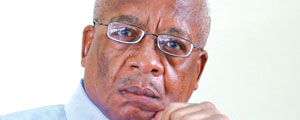
If I were to write a hagiography about Professor John Makumbe, who died this week, he would turn in his grave, at least in the proverbial sense.
Column by Conway Tutani
A hagiography is a biography or, in this case, an obituary, in which the writer presents the departed person as perfect or much better than they really are. Or the tendency to write so many admiring things about a person that it is not realistic — like an uncritical treatment of the subject with undue reverence. As if we have a hagiocracy (a government by holy persons) in Zimbabwe, going by the adulatory or excessively praiseful treatment of the rulers of the past 32 years in some sections of the media.
Makumbe was for honest scholarship, not hagiography, not to sugar-coat history and twist facts to serve some political agenda. He questioned the description of some leaders as if they were a master race or divine breed whereas they were merely after maximising their financial and class interests through entrenchment of political power. Idealised accounts like these allow people to feel good and suspend moral belief.
Makumbe was brutally frank and honest. He could be acerbic, using his sharp tongue to lash out at opponents. You wouldn’t want to be at the receiving end of his biting remarks. He was loud, lively, contentious and raucously humorous, describing himself as “the white man from Buhera” in self-mocking reference to his albinism. This “self-deprecation, to see yourself as a fool, to quote your inner weasel, your inner-pig, your inner-loser . . . can temper self-regard and can be a fine way to assert tentatively, to be bold and clear and at the same time more humbly open to revision.”
This reminded me of this joke before independence. There was this guy who was pitch black in complexion and this rather impudent fellow used to say to him: “Now I understand this constant reference to black majority rule — they will be talking of people like you.” I digress.
The albinism in a black man, coupled with the bulk of Makumbe’s physique, meant one couldn’t help, but notice him. Or, because of his loudness, you would hear him before you saw him.
Had he been born in another age, Makumbe wouldn’t have survived past babyhood; or in another country such as Tanzania where albinos are hunted down like animals, making the East African country the worst place in the world to be born with albinism. These people face rejection and revulsion for merely looking different instead of acceptance and compassion as fellow human beings with special needs.
- Chamisa under fire over US$120K donation
- Mavhunga puts DeMbare into Chibuku quarterfinals
- Pension funds bet on Cabora Bassa oilfields
- Councils defy govt fire tender directive
Keep Reading
Being an albino, Makumbe must have learnt early that he had to stand up to bullying. That became part of his survival kit as he navigated through life from childhood to adulthood. Without his intelligence, education, wit and bravery, the world would have been a much more hostile place for him to live in, but he made it, becoming a professor of political science and rising into a public figure who made people look and listen. This could have given him that steely and at times pugnacious streak which could border on irreverence. He called a spade a spade.
Compared to the rambling State media apologists who are not in a position to argue sensibly on a subject because they are mere propagandists, Makumbe’s writings were mostly short and to the point. The only value of apologists is that they provide an insight into the twisted thinking of dictatorship. Like one “Nathaniel Manheru” who last year labelled Makumbe a “bogey-white man”, whereas being an albino is not by choice. Instead, this remark tells or reveals more about Manheru than Makumbe.
Makumbe was self-mocking without being self-hating. This capacity of laughing at himself showed great mental and psychological maturity. He was not a whinger who would grumble at each and every opportunity. He did not take out on society the bullying and resentment he faced as an albino from childhood in the manner serial killers rage against the world. He was truly empowered before the term became associated with indigenisation in this country.
Makumbe gave real meaning to this saying by former United States First Lady Eleanor Roosevelt: “No one can make you feel inferior without your consent (permission).”
He had a sense of self-worth and knew his strengths. There was no place for self-pity in him. He stood his ground and spoke up for what he felt was right. He was not one to sit back and let people make him feel inferior. While tough, Makumbe was not unemotional or difficult to deal with.
This tribute to Makumbe from the US Embassy is not hagiographical: “He was respected as one who challenged his own assumptions, welcomed opposing perspectives, and appreciated the value and power of nuance. He influenced a generation of Zimbabwean students of political science and helped to shape and inform public discourse. In addition, he was a compassionate advocate for the rights of the disabled, in particular the albino community. ” Like him or hate him, Makumbe packed a punch — he was hard-hitting and had a powerful effect. This is what these times call for — the will to persevere even when faced with difficult obstacles or opponents. Otherwise known as the fighting spirit.











